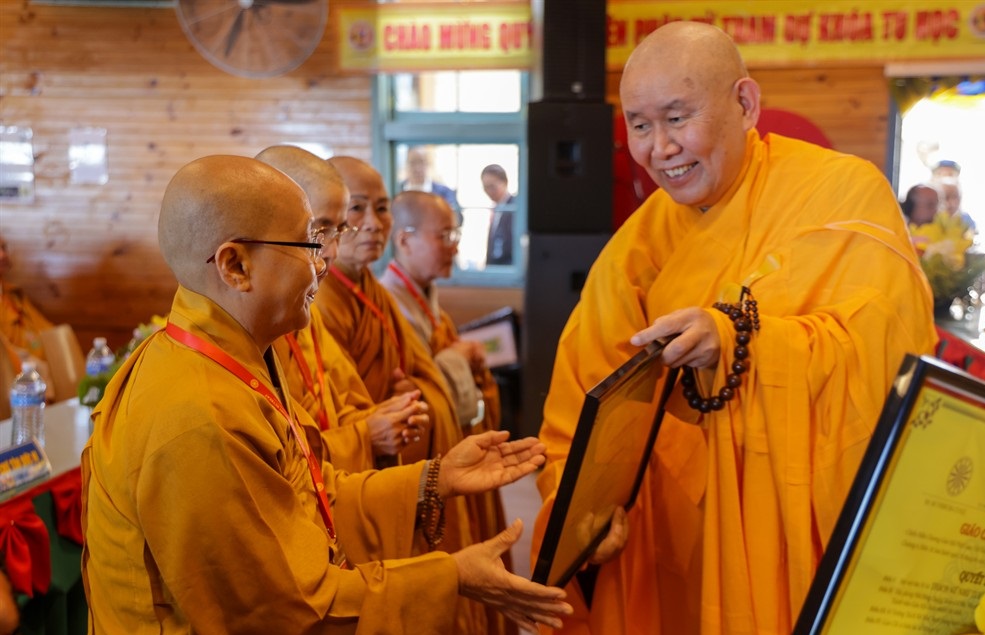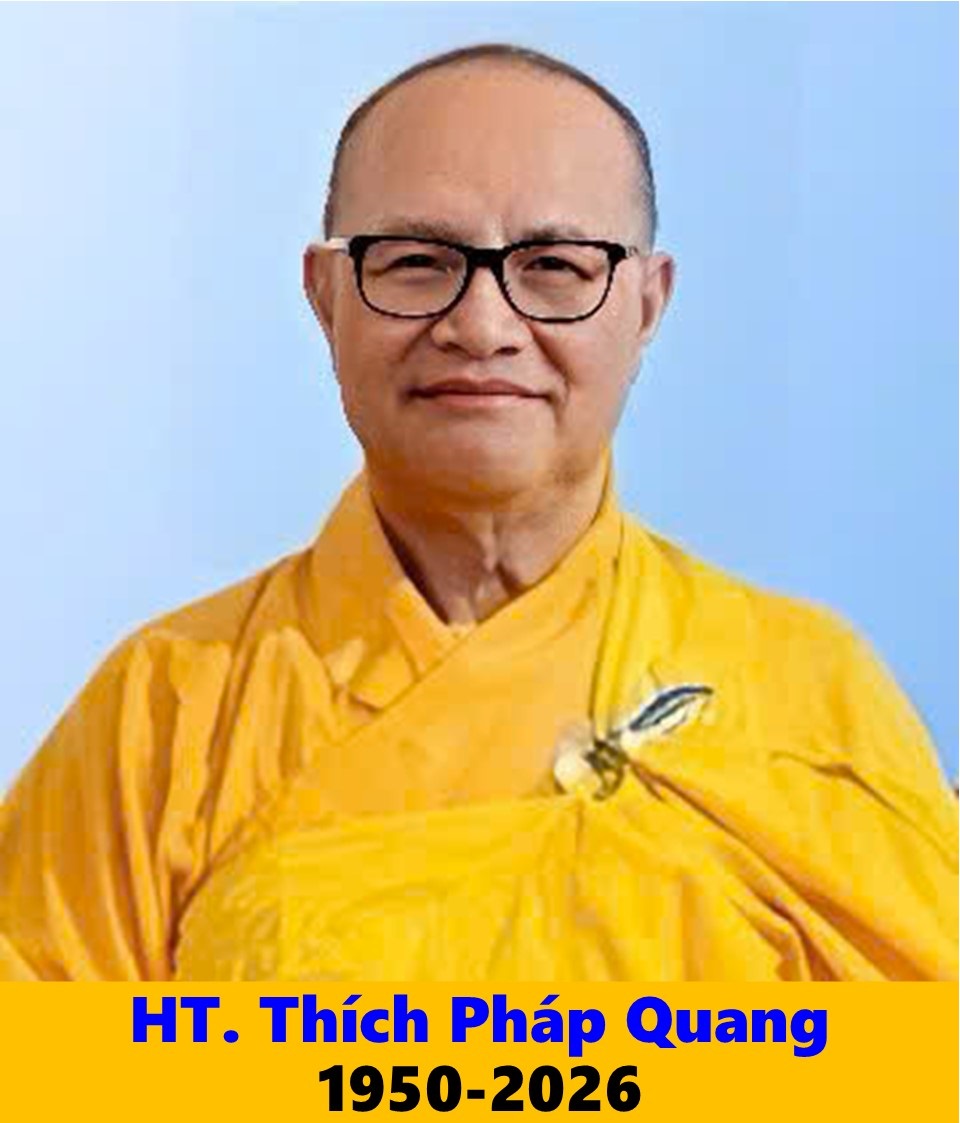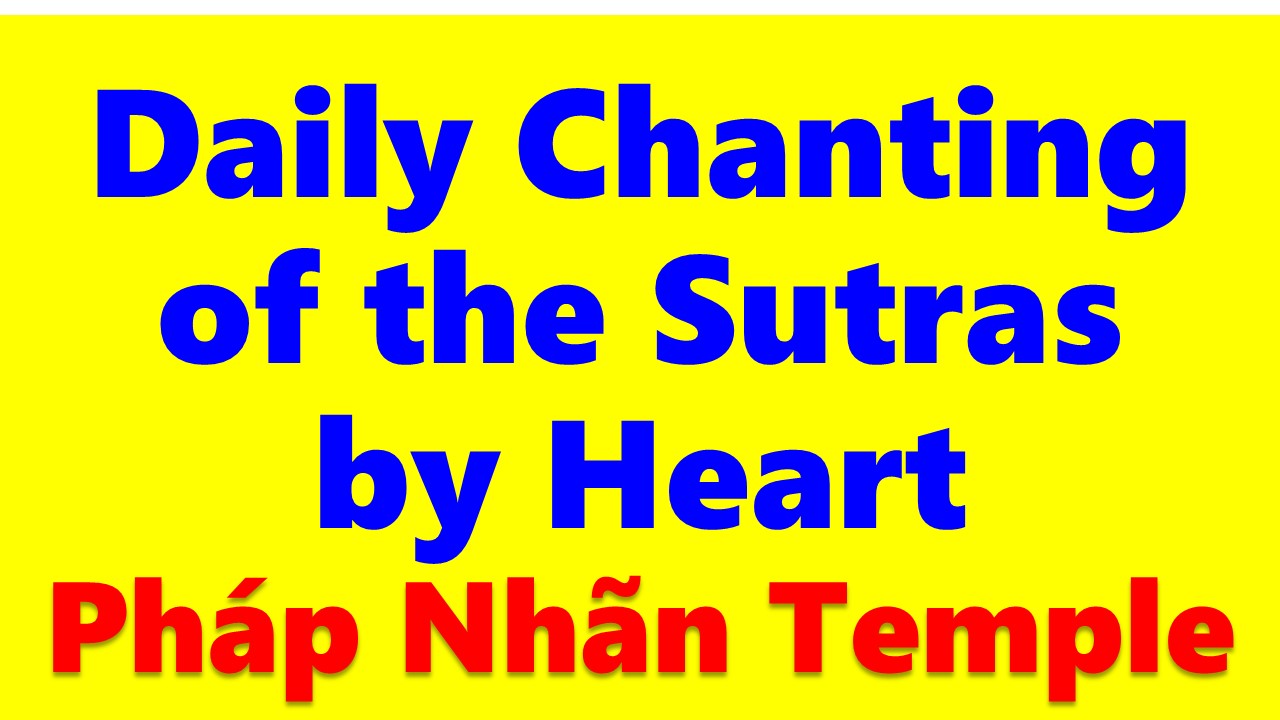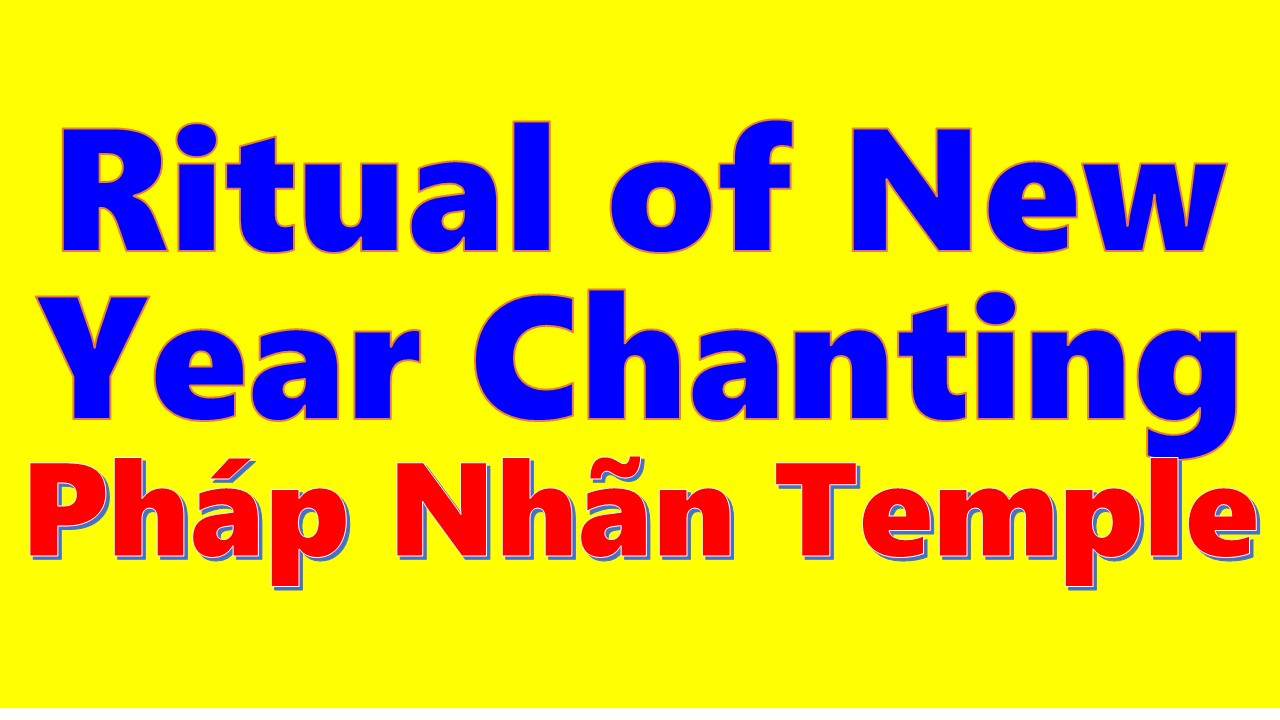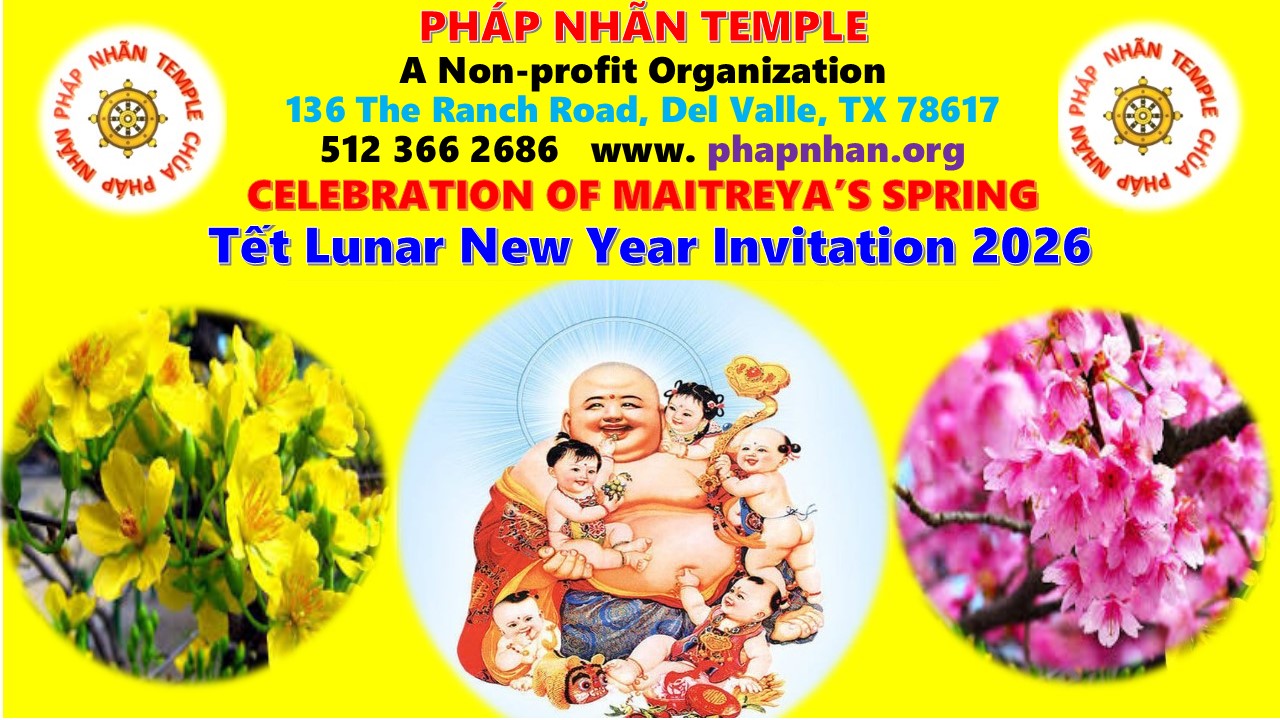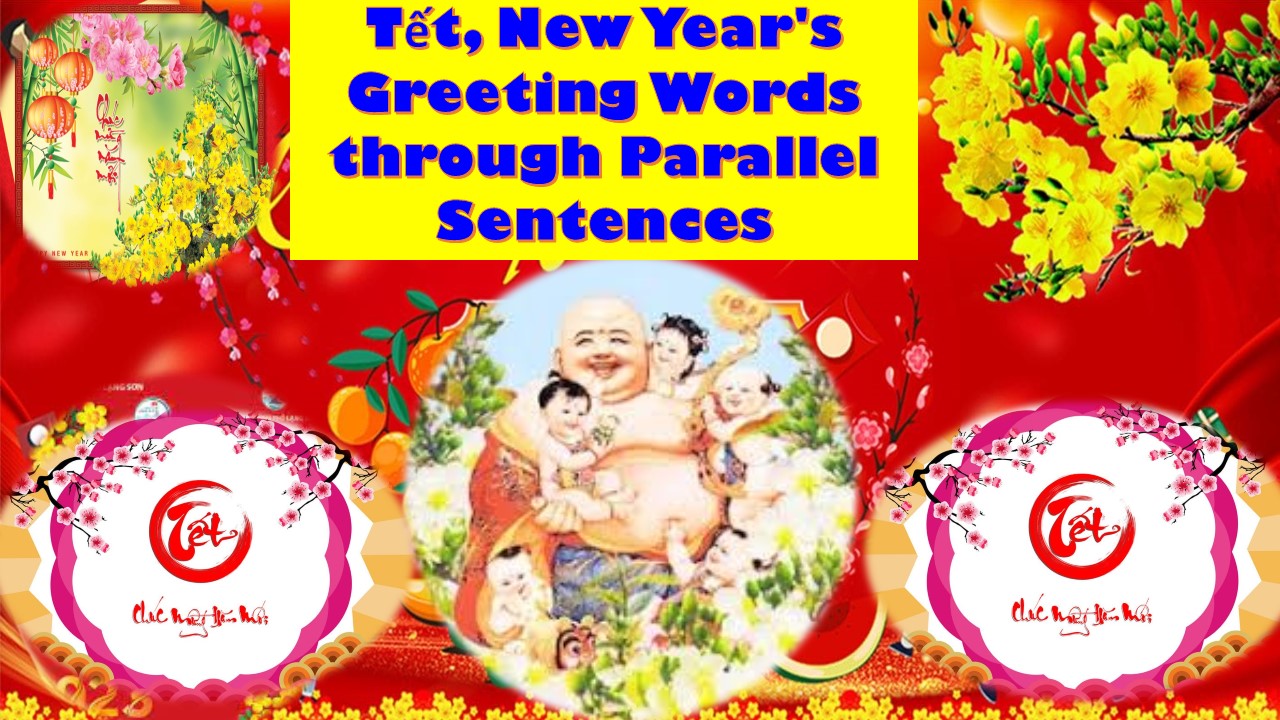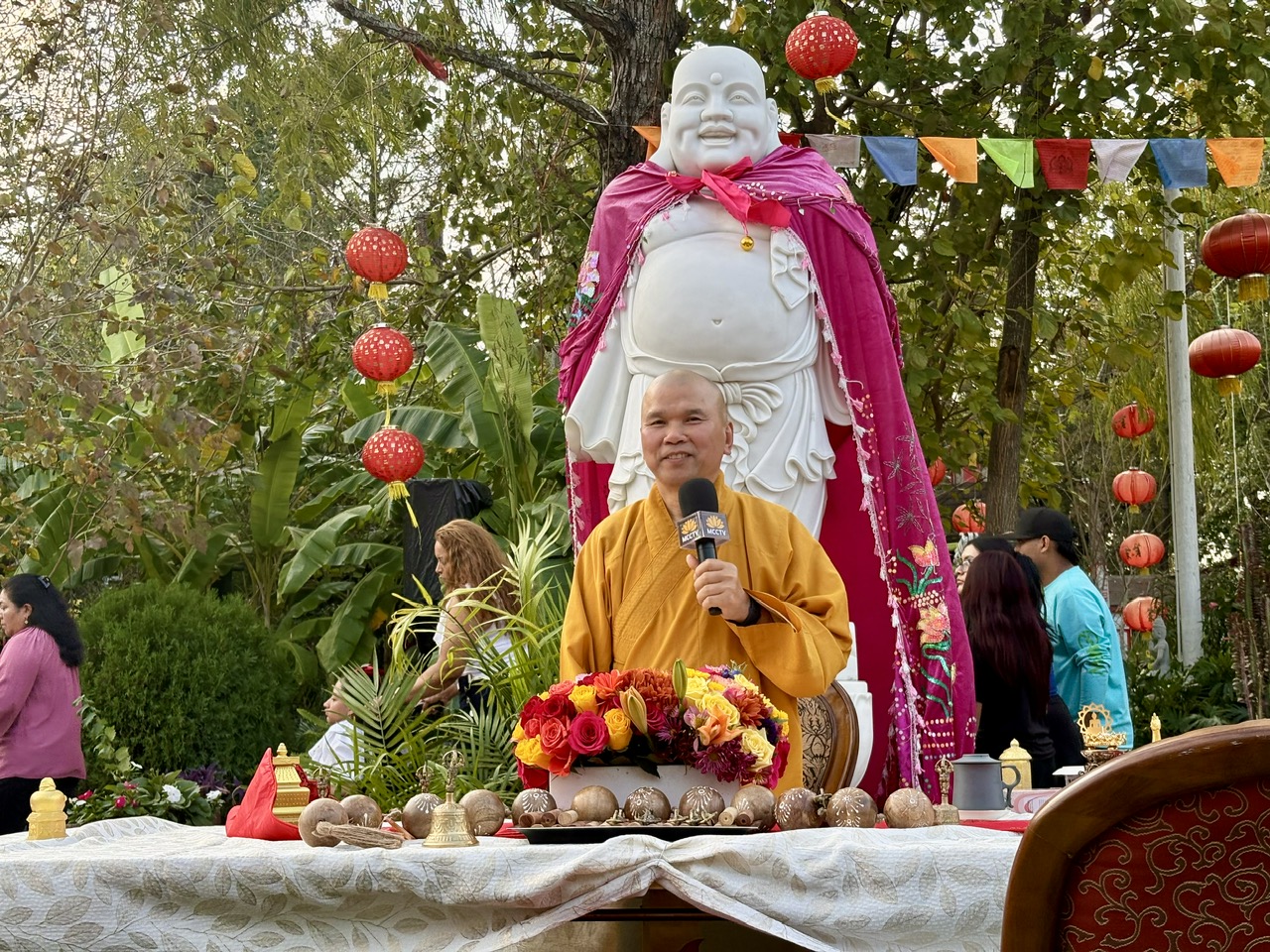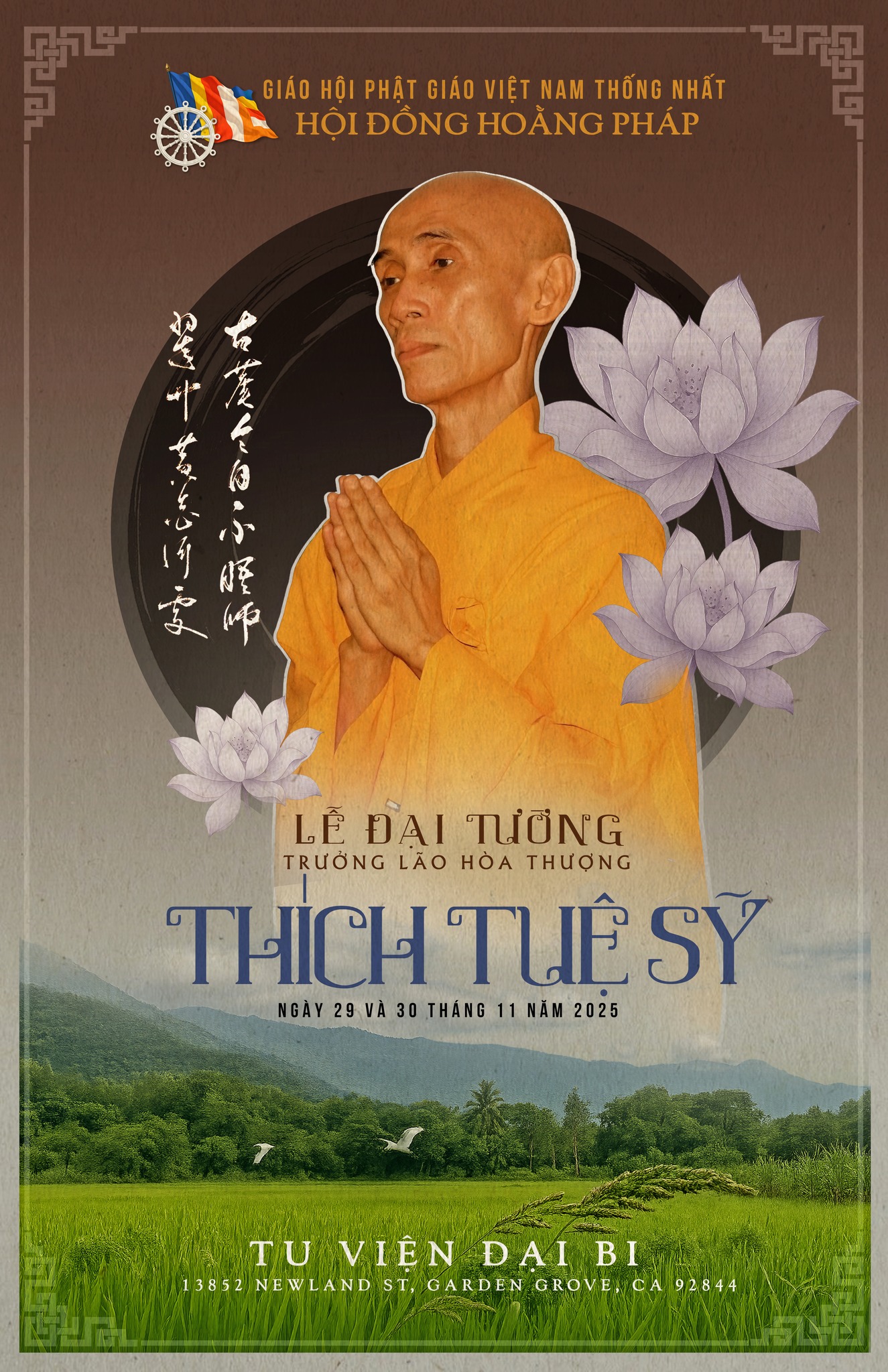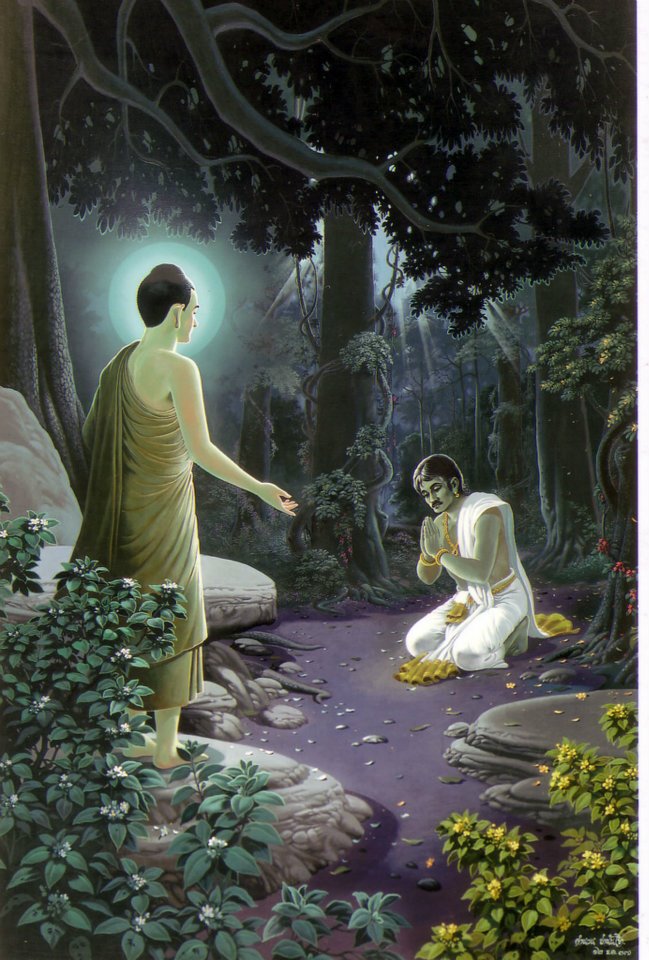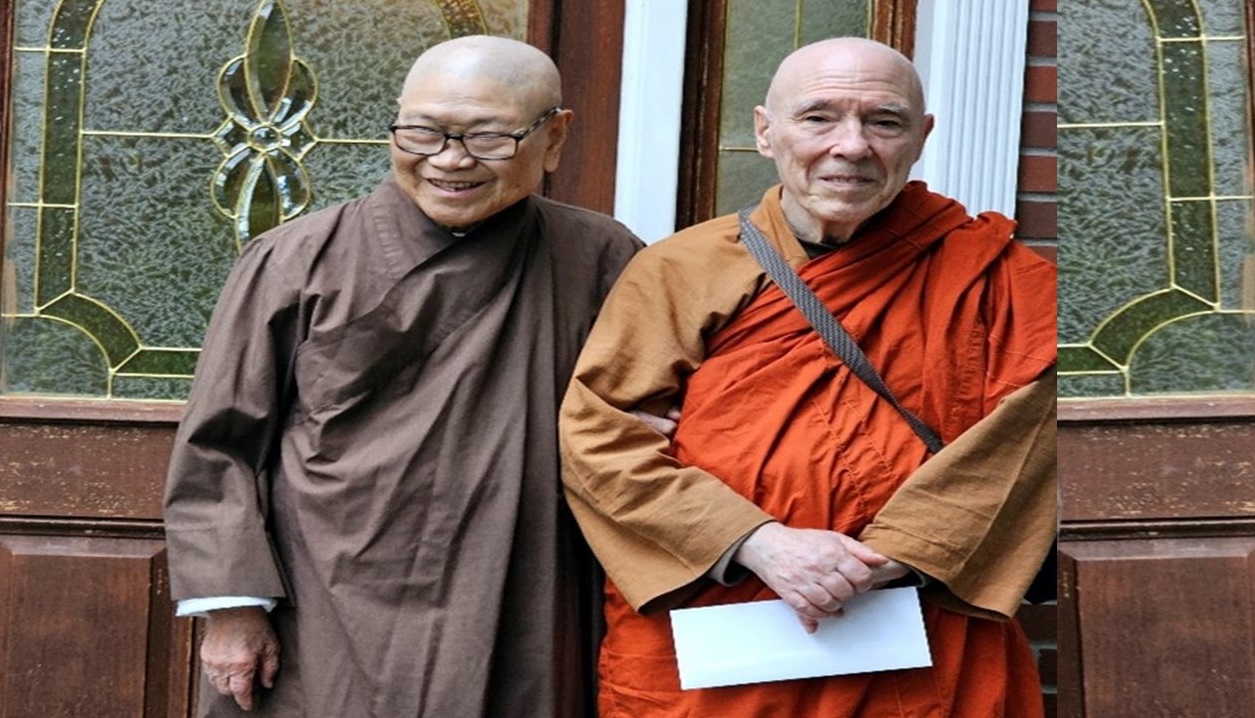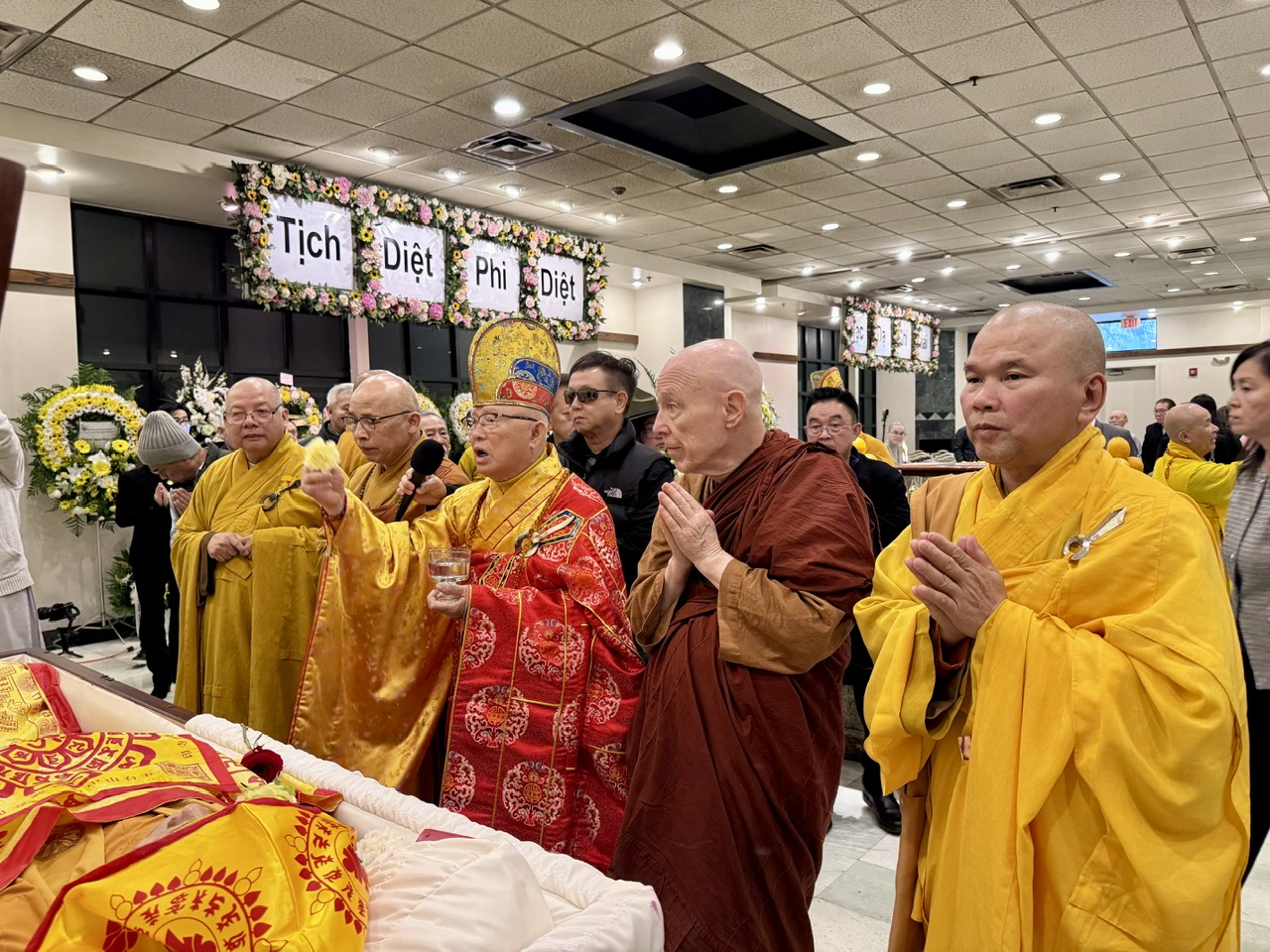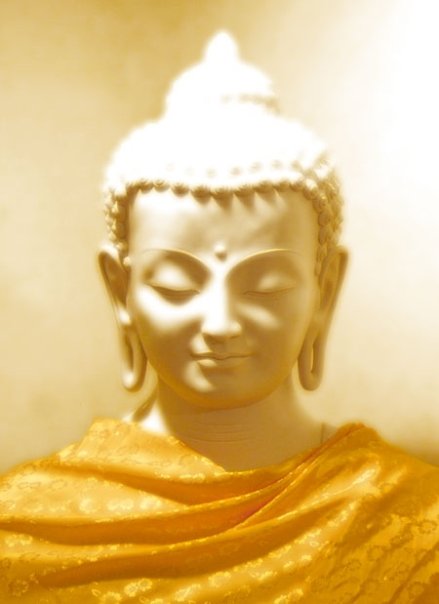
DISCOURSE ON THE WHITE-CLAD SUTTA
Thus have I heard. On the occasion the World-Honored One was staying at Jetavana Monastery wholeheartedly offered by Sudatta Anathapindika and Prince Jeta. On a beautiful day, lay male devotee Sudatta along with five hundred devotees paid a visit and homage to Venerable Sariputta and other monastics. At that time, Venerable Sariputta used many skillful teachings to preach the Dharma to them, bring many joyful feelings of the Dharma practice, and help them arouse their confident hearts of thirsting for the Triple Gem.
Then, Venerable Sariputta led them all to a hut of the Buddha, prostrated at his feet, and sat down respectfully to one side in mindfulness and awakening postures. The World-Honored One considerately taught them the key things devotees[1] should be diligent to practice the Buddhadharma daily to bring peacefulness and happiness to themselves and to other people right in the present life. (Bell)
The key things, namely, are the Five Ethical Trainings and Four Noble Contemplative Minds. If devotees lead their devotional and exalted lives, and regularly practice them right in the present life, they can obtain perfect peacefulness and happiness, contribute to bringing authentic peace to the many all over the planet. Coming at the time of death, they certainly know that they will not fall into the three evil realms: Hells, hungry ghosts, and animals. Upon understanding and practicing so, devotees have the ability to cultivate, transform their bodies and minds, attain the stream of holy fruition right in the present life.
The First Ethical Trainings: Devotees who are determined to keep far away from all forms of killing living beings, including creatures. Be aware to nurture and arouse our loving-kindness and compassion hearts by protecting our and others’ lives. Not killing ourselves, not killing living beings by ourselves, not telling other people to kill living beings, not inciting other people to kill living beings, and not seeing other people killing living beings, we rejoice to follow them. Aware to protect natural environment, give up weapons and violence, practice loving-kindness and compassion, transform anger and hatred, know to repent, correct, and be ashamed of wrong deeds. Thanks to understanding and practicing so, devotees have the ability to eradicate the roots of intention of killing living beings, lead their lives of peacefulness and happiness right in the world. (Bell)
The Second Ethical Trainings: Devotees who are determined to keep far away from all forms of stealing, not to take what is not given, respect the possessions of other people, cherish almsgiving, help people go beyond needy circumstances, find joy before almsgiving, during almsgiving, and after almsgiving; almsgiving without regretting and almsgiving without expecting anything in return. Thanks to understanding and practicing so, devotees have the ability to transform and let go of their greedy and stingy hearts, lead their lives of integrity and altruism. (Bell)
The Third Ethical Trainings: Devotee who is determined to keep far away from sexual misconduct and adultery lives faithfully with a legal spouse, stays away from kids’ sexuality, spends a proper time looking after descendants, does not allow them to play violent games, limits them to play electronic games online, allows them to go to school, spends a suitable time helping them do homework, and teaches them understanding and love. Thanks to understanding and practicing so, devotees have the ability to build happiness for their families, and contribute to bringing peacefulness and happiness to schools and to societies. (Bell)
The Fourth Ethical Trainings: Devotees who are determined to keep far away from telling lies – only tell the truth, do not say anything deceitful and false – only say reliable and confident words, do not say anything separate and disharmonious – only say words of construction and suggestions, do not say anything rude and evil – only say polite and elegant words, do not say anything useless and meaningless– only say useful and meaningful words, do not say anything despicable, contemptuous, and reproachful – only say commendable, appreciative, and solidarity words, do not say anything critical, hasty, stressful, and angry – only say loving, affable, pleasant, harmonious, reconciling words. Thanks to understanding and practicing so, devotees who are worthy to get confident, have the ability to bring prestige and peace to many people. (Bell)
The Fifth Ethical Trainings: Devotees are determined to keep far away from alcohols, intoxicants, smoking, and gambling, especially narcotics, to give up depraved and violent enjoyment habits, such as movies, newspapers, radio, television, not to buy, sell, product, and stockpile weapons and poisons, not to plant cannabis and opium, not to broker and trade in people and rare wildlife.
Be aware that the consumption and use of four kinds of daily nutriments comprise edible foods, feeling foods, volitional foods, and conscious foods in mindfulness and awareness, devotees can abandon and let go of those toxins. Thanks to understanding and practicing so, they can live healthy and lucid lives and contribute to bringing true peacefulness and happiness to themselves and to other people right in the present life. (Bell)
The Five Ethical Trainings have been taught by the Tathagata, next are the Four Noble Contemplative Minds.
The First Noble Contemplative Mind
Devotees should contemplate: “The World-Honored Buddha; the Master is our peaceful, noble, and spiritual Leader; the Master is the most worthy to be made offerings; the Master understands and loves; the Master has fully virtuous conduct and insight; the Master has obtained perfectly peacefulness and deliverance; the Master understands the world clearly; the Master has the ability to subjugate people; the Master of both gods and human beings; the Master attained enlightenment and awakening completely; the Master is worthy to be best honored and respected in the world.” (Bell)
The Second Noble Contemplative Mind Devotees should contemplate: “The Dharma of the World-Honored One that has been well proclaimed by the Buddha himself is very practical in the present, has value beyond time, has the ability to transform one’s body and mind, has the ability to extinguish defilements of greed, anger, delusion, arrogance, doubt, wrong view, etc. Taking refuge in the Dharma, a wise one who can also cultivate oneself masters the Dharma, comes and sees, comes and hears, comes and understands, comes and learns, comes and practices, comes and enjoys the flowers and fruits of peacefulness and happiness right here and right now in the present life.” (Bell)
The Third Noble Contemplative Mind
Devotees should contemplate: “The Sanghabody of the World-Honored One is the Community going on the really good, true, honest, beautiful, and appropriate path; the Community following the Buddhadharma practices the Buddhadharma, and lives correctly with the Buddhadharma. In the noble Community, there are those who have attained and are attaining the first holy fruition – the stream-enterer, the second holy fruition – the once-returner, the third holy fruition – the non-returner, and the fourth holy fruition – Arahant, comprise four pairs and eight fruitions of holy people,[2] accomplish all aspects of ethics, meditation, wisdom, deliverance, and deliverance with right understanding. This Community, deserving to be taken refuge in, served, respected, honored, admired, and made offerings, is the field of merit good for people to sow and to plant.”[3] (Bell)
The Fourth Noble Contemplative Mind
Devotees should contemplate: “The Dharma Precepts of the World-Honored One – the Disciplines (Vinaya) and right mindfulness the Sangha receiving, practicing, spreading, and observing are the perfect precepts (Sīla) body, are the never broken precepts body, are the never polluted precepts body, are the never spotted precepts body, are the never mingled precepts body, are the precepts body praised and admired by wise people, are the precepts body with the potential to protect freedom, are the precepts body leading us to fearlessness, are the precepts body leading us to ethics, meditation, wisdom, deliverance, and deliverance with right understanding, are the precepts body leading us to peacefulness and happiness forever.”[4] (Bell)
Dear devotees, thanks to contemplating and practicing the four noble contemplative minds entirely, you have the ability to put an end to cravings, ignorance, unhappiness, sorrow, and suffering, transform afflictions of greed, anger, delusion, etc., go beyond the three evil realms: Hells, hungry ghosts, and animals, obtain happiness and great joy, build a Paradise or a Pure Land right on earth, and open up many stable and good directions for life. (Bell)
After having proclaimed the Five Ethical Trainings and the Four Noble Contemplative Minds to devotees, the World-Honored One considerately summarizes a verse of easy-understanding example as follows:
You who should be bright
Know fear of the evil realms
Diligently practice the Dharma
To transform all sufferings.
Observing the Five Ethical Trainings:
Not killing living beings
Nourishing the compassion heart
Leading lives of less sickness and sorrow
Your longevity always increases.
Not taking what is not given
Letting go of your stingy hearts
Knowing to make offerings and almsgiving
Bringing benefits to yourselves and to others.
Not sexual misconduct and adultery
Not abusing children’s sexuality
Being faithful to a legal spouse
Living peacefully and happily.
Not saying deceptive words
Only telling the truth
Right conviction and prestige
Are always trusted.
Determined not to use
Alcohol and drugs
Gambling and smoking
Your minds become lucid and calm.
You frequently contemplate
Virtues of the Buddha,
The Dharma and Sangha,
Ethics and meditation,
Wisdom and deliverance.
Joy in almsgiving
Joy in making offerings
Skillfully sowing and planting the field of merit
Skillfully cultivating good faculties
Diligently practicing right mindfulness
Enlightenment and happiness
Appear right in the present. (Bell)
Devotees hear clearly
The Tathagata set the examples:
Observe a flock of cows
With the yellow, white ones
With the red, black ones
The brown ones with yellow spots
Or the pigeon gray color.
Whether they bring any color
Or where they come from
But their true values
Depend on their transportable strength.
Those that are healthy
are well trained
Pull the carts strongly and quickly
Transport many trips
Are the useful oxen.
All over the world
Many different kinds of people
Kings or civilians
Monastics or lay devotees
Females or males
The young or the old
Those who observe the precepts
Live peacefully and calmly
Become virtuous people
Become exemplary people
For oneself and for others.
Making offerings to people like this
Will obtain great virtuous blessings.
The Tathagata never discriminates
Between castes and origins
Those who lack talent, virtue
Wisdom, and cultivation.
Do not enlighten anyone,
Do not make benefit for anyone.
Making offerings to those people
Without great virtuous blessings.
The Tathagata’s disciples
Always cultivate wisdom and virtue
Their hearts direct to the World-Honored One
Diligently practice the Buddhadharma
Diligently support the Sangha
Cultivate the good faculties
Sow the field of merit
Attain Nirvana – true happiness
Right in the world.
After letting go of the physical bodies
You are born up to a peaceful realm
Continue vowing to save living beings
In the worlds of gods and human beings
practice the Dharma together
to benefit themselves and other people.
After they had listened to the Buddha’s teachings, Venerable Sariputta, Monastics, Sudatta Anathapindika, and other five hundred devotees felt delighted and excited, understood the Buddha’s teachings thoroughly, vowed to practice and propagate the Buddhadharma to bring benefits and happiness to living beings together right in this world.
Namo The Original Master
Sakyamuni Buddhaya.
(3 time, Bell)
[1] www.accesstoinsight.org/tipitaka/an/an05/an05.179.than.html
[2] Sotāpanna means the noble person who enters the first holy stream is called the stream-entry (Sotāpatti phala), the stream-winner, or the stream-enterer (Sotāpanna). This person has attained the Path (Magga) (i) and the fruition (Phala) (ii) of Sotāpanna. Sakadāgāmī means the noble person who enters the second holy stream is called the once-returner (Sakadāgāmī). This person has attained the Path (Magga) (iii) and the fruition (Phala) (iv) of Sakadāgāmī. Anāgāmī means the noble person who enters the third holy stream is called the non-returner (Anāgāmī). This person has attained the Path (Magga) (v) and the fruition (Phala) (vi) of Anāgāmī. S. Arahanta = or P. Arahant means the noble person who enters the fourth holy stream is called the one who has deserved to be offered (1), who has killed the enemies of afflictions (2), who has broken the evil things completely (3), who has made maras of defilements terrified (4), who has ended the samsara of birth and death (5). This person has attained the Path (Magga) (vii) and the fruition (Phala) (viii) of Arahanta.
(i) and (ii) as one pair, (iii) and (iv) as one pair, (v) and (vi) as one pair, (vii) and (viii) as one pair, all consist of four pairs. Calculating from the Path (Magga) and the fruition (Phala) of (i) to the Path (Magga) and the fruition (Phala) of (viii), we totally have the four pairs and the eight fruitions of holy persons (Cattāri purisayugāni aṭṭha purisapuggalā).
[3] http://www.aimwell.org/assets/PathofPurification2011.pdf Part II, Chapter VII, pp. 215 – 218.
[4] http://www.aimwell.org/assets/PathofPurification2011.pdf Part II, Chapter VII, pp. 218-9.





